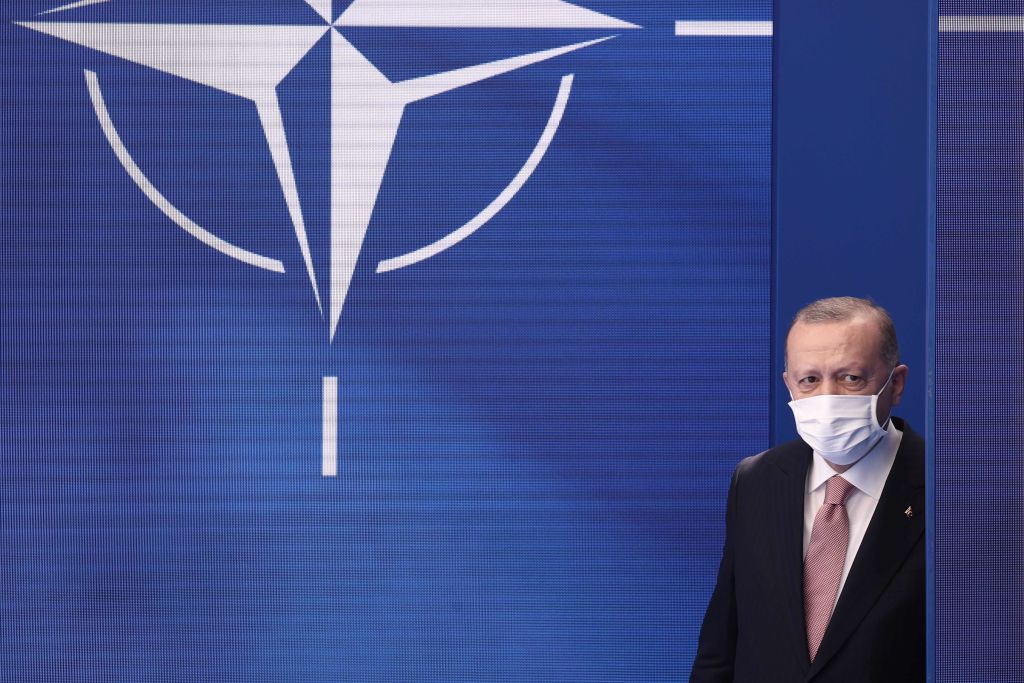Turkey’s fortunes under Erdogan
Posted By Amin Saikal on October 29, 2021 @ 06:00

President Recep Tayyip Erdogan last week ordered the expulsion [1] from Turkey of ambassadors of 10 Western countries, including NATO allies such as the United States, for meddling in Turkey’s internal affairs. The envoys had issued a joint statement asking for the release of the jailed philanthropist Osman Kavala. The president stressed the independence of the Turkish judicial system in dealing with Kavala, who is charged with funding the 2013 protests and supporting the 2016 failed coup against Erdogan.
Erdogan’s decision carried the risk of triggering a serious crisis in Turkey’s relations with the West. However, calamity was averted [2] after the envoys declared their diplomatic obligation of ‘non-interference’, enabling Erdogan to back down. This isn’t the first time that the Turkish leader has vented his anger against Western allies. What has motivated him to become so hostile towards them?
Under Erdogan, Turkey has been reorienting its domestic and foreign policies. On the internal front, the country has transcended into a delegated democracy, where the president has harnessed sufficient power to act at his whim during the elected term of his office. Erdogan has incrementally tightened his grip on the Turkish polity without entirely deconstructing its electoral democratic framework. He has treated the domestic opposition very harshly, especially after the failed coup, for which he blamed one of his former Sunni Islamist comrades-in-arms, the ageing scholar and spiritual leader of the Gulen movement, Muhammed Fethullah Gulen, who has lived in self-imposed exile in the US since 1999. Erdogan has forcefully cleaned out his administration and Turkey’s educational institutions and media outlets of actual and suspected ‘Gulenists’ at the cost of being accused of serious human rights violations.
On the external front, Erdogan has been persistently critical of the US and some European allies for a number of perceived transgressions. He has rebuked them for failing to back fully his widespread crackdown on opposition, provide sufficient assistance to Turkey to cope with the burden of the Syrian refugees, and abandon their cooperation with Kurdish minorities in Syria and Iraq as a source of aid to the autonomy-seeking Turkish Kurds, who form some 20% of the country’s 84 million people. In addition, he has resented Washington’s refusal to extradite Gulen for trial on treason charges. He is also bitter about the US dropping Turkey from the list of its buyers of F-35 fighter jets because of the country’s purchase of the Russian S-400 missile system.
He has concurrently forged close economic, trade and strategic ties with Russia and China and expanded Turkey’s role in the Muslim Middle East. While chiding Israel for its treatment of the Palestinians under occupation and sympathising with the Muslim Brotherhood, which is banned in Egypt and shunned in many other Arab countries, he has intervened in several regional conflict zones from Syria to Libya and joined forces with oil-rich Qatar to widen Turkey’s influence. No wonder that Israel sees Erdogan as a foe and that Saudi Arabia and some of its allies, especially within the Gulf Cooperation Council, view him as seeking to revive ‘Ottomanist’ ambitions. In contrast to Saudi Arabia, which claims leadership of the Sunni Muslim world, Turkey has improved its relations with Iran, which champions the cause of Shia Islam, despite their differences in Syria.
All this comes against the backdrop of Turkey’s serious economic problems. Inflation and unemployment are soaring, the Turkish lira has lost around 50% of its value, and foreign investment is declining. Erdogan has been criticised at home and abroad for being a self-aggrandising authoritarian who seeks to part ways with Turkey’s traditional Western allies in favour of like-minded leaders including Russian President Vladimir Putin.
Erdogan has scoffed at all this as nonsense. From his perspective and that of the devoted followers of his Justice and Development Party, or AKP, he has been doing what’s needed to make Turkish democracy work and to strengthen the country’s standing as a proud, influential and independent actor on the world stage. He doesn’t see any incompatibility between Turkey being a critical member of NATO, with the second largest number of military personnel in the alliance, and having wide-ranging ties with other powers. His AKP supporters admire him for being a strong, charismatic and personally devout Muslim nationalist who is fully in tune with the strategic significance of Turkey to both the West and the East. As such, he feels powerful enough to order the departure of allied envoys and then withdraw it once they have paid homage to him.
He is a leader whose actions can be criticised, but not dismissed.
Article printed from The Strategist: https://www.aspistrategist.org.au
URL to article: https://www.aspistrategist.org.au/turkeys-fortunes-under-erdogan/
URLs in this post:
[1] ordered the expulsion: https://www.aljazeera.com/news/2021/10/23/turkeys-erdogan-orders-expulsion-of-10-western-ambassadors
[2] calamity was averted: https://www.aljazeera.com/news/2021/10/25/erdogan-chairs-turkish-cabinet-to-discuss-expulsion-of-envoys
Click here to print.